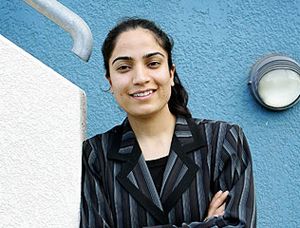By Anita Quigley
MALALAI Joya says her mother worries about her - particularly when she travels to foreign countries.

Malalai Joya, the youngest member of the Afghan Parliament (Photo: Darren England)
But when you consider that the 28-year-old youngest member of the Afghan Parliament has survived four assassination attempts in her own country, you would think her trips abroad would come as a welcome relief to her mum.
Ms Malalai (her first name is Joya) is visiting one of those worrying foreign countries this week to bring a message from her people.
It is not one Prime Minister John Howard will like.
Nor is it popular with her fellow 248 members of the Wolesi Jirga (Afghanistan's National Assembly), whom she refers to without hesitation as warlords, druglords and criminals.
The short of it is we have failed.
It is this outspokenness that has made her the woman most hated by fundamentalists in Afghanistan and why she is escorted by six bodyguards when at home.
She continues to wear the burqa, the garb enforced by the Taliban – but now by choice, for security reasons, so she cannot be identified.
However, when I meet her in Brisbane there are no bodyguards and there is no burqa – or even a headscarf – to cover her shoulder-length thick, black hair, neatly pulled back in a ponytail.
There is just a young woman, barely 157cm, who at first is so shy and softly spoken that even a barely 162cm me has to lean over to hear her greeting.
Conservatively dressed, she is perspiring profusely in the 31C heat and 90 per cent-plus humidity.
When she left Kabul the previous day it was still a freezing -8C at night, despite it being the start of spring.
The mention of the new season reminds me of a quote she gave during an interview with the BBC last January: "They will kill me, but they will not kill my voice, because it will be the voice of all Afghan women. You can cut the flower but you cannot stop the coming of spring."
I remind her of it and she simply nods and gives a polite smile.
In the few hours I spend with her she repeats different versions of it. Not in a boastful way, or to seem brave, but with defiant humility.
"Everyone wants to be alive, especially the young generation," she says. "They have lots of hopes, but right now I have no personal hopes because first I am thinking of our people, who have no kind of liberation, no education and who have no human rights – particularly the women of Afghanistan.
"It is because of them that I put my life at risk and will continue to do so."
Those who want to silence her permanently are the warlords, the druglords and the criminals she now devotes much of her time to exposing and with whom she sits in Parliament.
These men, along with Ms Malalai and 67 other women, were elected during the parliamentary and provincial council elections in 2005 amid accusations of fraud – a year after the presidential election.
As she describes their election as worse than the Taliban, her quietness disappears and she becomes a confident woman raging about the situation for herself and her country.
"If Australia really wants to be a true and honest friend of the Afghan people, then they need to act independently of the US," she says with eyes blazing.
"By these warlords and criminals being allowed to rule Afghanistan we are worse off and President Hamid Karzai is their hostage.
"Why? Because they (the US) have replaced the evils of the Taliban with the Northern Alliance killers who from 1992-1996 did lots of crimes... and now with the support of the US and its allies, under the mask of democracy, have come to power.
"Life is as bad, if not worse. There continues to be no women's rights in Afghanistan. In some provinces they ban schools for women and publish leaflets warning them not to go."
It is comments like this that she gave in her first speech to Parliament last May, resulting in colleagues throwing water bottles at her and shouting: "Take her and rape her."
But what angers her most is the recent approval by fellow MPs to grant an amnesty from charges of war crimes in the past 25 years.
She, with the United Nations, has condemned the Bill, which is designed to protect the warlords sitting in Parliament who in the past have been accused of human rights abuses.
"The hanging of Saddam Hussein has made these warlords worried – they think without such a Bill, they will be next," she said.
The Bill, which has been passed by the Lower House, is yet to be signed by President Hamid, who she fears will be forced into it.
"This Bill goes against the will of the people," she said. "National unity cannot be achieved through forgiving national traitors. They must be tried."
Tomorrow Ms Malalai will be in Sydney as a guest of UNIFEM, speaking for International Women's Day.
The lucky 1500 who hear her should appreciate how courageous that act will be.



